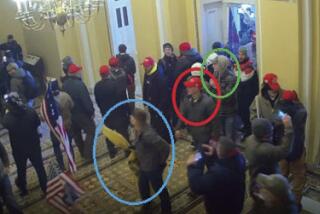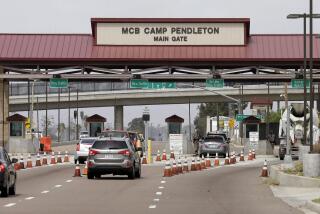In Afghanistan, Marines handling detainees by the book
- Share via
Reporting from Spin Ghar, Afghanistan — The three men were blindfolded, their hands bound in front of them with plastic flex cuffs, and each was in the firm grip of a Marine. Their loose-fitting clothes were faded and dusty, their thick beards beginning to show gray.
They had been spotted outside the town of Marja in southern Afghanistan carrying a shovel near a spot where a roadside bomb had been planted. They had a suspiciously large amount of cash, and two of them had tested positive for explosive material on their hands.
So the Marines brought them to this outpost of Bravo Company, 1st Battalion, 3rd Marine Regiment. From here, the men will be taken to battalion headquarters.
It’s a common scene throughout Helmand province: Marines, a bit like cops on the beat, returning from patrol with detainees to be questioned and possibly transferred to the Afghan national police or the holding area at the battalion headquarters, Forward Operating Base Geronimo.
The Marines have been warned: Any rough treatment or even harsh language aimed at a detainee is forbidden. When making an arrest, they are instructed to ask their subject if he will voluntarily go with them.
“We don’t want any of our Marines to make a scene,” said Capt. Yuri Paredes, commander of the battalion’s Alpha Company. “People will think we’re degrading them.”
Cases of detainees resisting are few; even while protesting their innocence, most go without a struggle.
For the Marines, it’s a test of their ability to follow orders and keep their anger in check. Most detainees are suspected of planting roadside bombs or taking sniper shots at troops.
“It’s hard to put our feelings aside when these guys were shooting at Marines,” Staff Sgt. Jason Moore said. “But we do it; that’s what makes us better than them.”
Moore was loading the three suspects into a Marine vehicle designed to withstand the blast of roadside bombs. He saw the oddity of it: putting detainees in a vehicle meant to keep them safe if the vehicle strikes a bomb planted by militants.
“Yeah, it’s weird, isn’t it?” Moore said.
Two of the three had protested, through an interpreter, that they were mere cabdrivers. They had been searched and their possessions put in plastic bags: candy, hand cream, matches, a flash drive and several hundred dollars in Afghan currency.
“That’s too much money for farmers or cabdrivers,” Moore said.
True to their institutional culture, the Marines have a lengthy set of instructions on how to treat detainees. The procedures were rewritten after a detainee died in 2003 while in Marine custody in Iraq. Now, at each stop, as the detainees are being transferred, they are examined to spot any sign of rough treatment.
“The only way we’d rough them up is if they come at us,” said Cpl. Jeffrey Rains, who deals with detainees brought to the Alpha Company outpost in the town of Nawa. “Otherwise, we want to make sure they leave in the same shape they arrived.”
Detainees are cuffed with their hands in front -- not in back, which would be more uncomfortable during a bumpy ride over rutted roads. Except for the official photo for the record, no other photographs are permitted.
The Marines have 96 hours to question a detainee before either releasing him or transferring him to the Afghan national police. Some, upon release, are given money as compensation for being detained.
Within hours of the three being arrested, a tribal elder had come forward to vouch for them.
“It happens all the time. You detain someone, and suddenly an elder says he can find 25 guys who will say the guy was with them and is innocent,” said Lt. Col. Matt Baker, commander of the 1st Battalion.
It’s a tricky proposition: The Marines want to stop the proliferation of roadside bombs, but they also are currying favor with tribal elders, hoping to win their support against the Taliban.
The rules for detainees reflect the goals of the counterinsurgency campaign: Better to let a small-fry Taliban loose rather than risk alienating an influential mullah or tribal elder.
Baker ordered the three detainees released, but only after elders signed an agreement taking responsibility for the men’s conduct.
“We told them: Any more trouble and we come after them, no second chances,” he said.
“We’ll see.”
More to Read
Sign up for Essential California
The most important California stories and recommendations in your inbox every morning.
You may occasionally receive promotional content from the Los Angeles Times.













